Politics
Trump, in rhetorical shift, says Ukraine can retake all its land
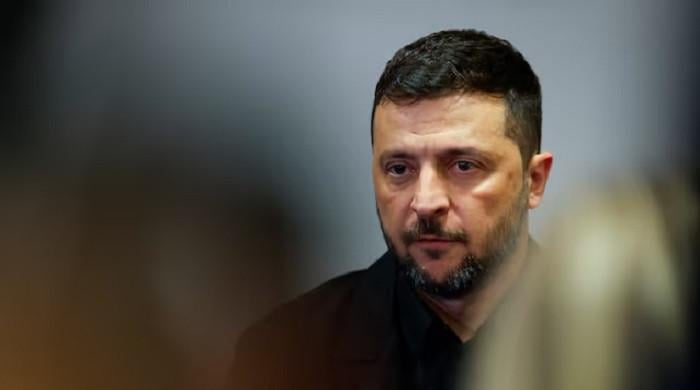
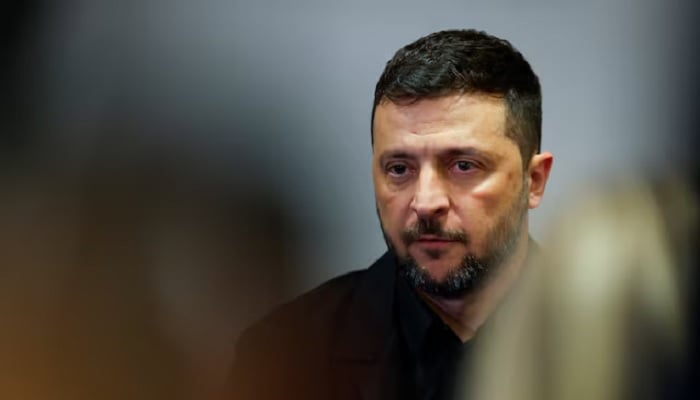
- Shift occurs after Trump and Zelensky meet at UN.
- Trump says Russia bracing for economic problems.
- Kyiv welcomes shift, but no sign of US policy changes.
US President Donald Trump said on Tuesday that he believed Ukraine could retake all its land occupied by Russia and that Kyiv should act now, with Moscow facing “big” economic problems, in a sudden and striking rhetorical shift in Ukraine’s favour.
But there was no sign that Trump’s words would be matched by a change in US policy, such as a decision to impose the heavy new sanctions on Moscow sought by Ukrainian President Volodymyr Zelensky as he travelled to New York this week.
“Putin and Russia are in BIG Economic trouble, and this is the time for Ukraine to act,” Trump wrote on Truth Social, shortly after meeting Zelensky on the sidelines of the UN General Assembly in New York.
“After seeing the Economic trouble (the war) is causing Russia, I think Ukraine, with the support of the European Union, is in a position to fight and WIN all of Ukraine back in its original form,” he said.
That would ostensibly require Kyiv to expel Russian forces from 20% of its territory, including the Crimean peninsula Moscow has held since 2014, in what would be an extraordinary reversal.
Trump has previously suggested Kyiv should consider giving up territory in order to make peace, fueling Ukrainian fears of behind-the-scenes talks for a deal that would seek to recognise its occupied lands as legally Russian.
Europe’s foreign policy chief, Kaja Kallas, praised Trump’s statements, saying: “These have been very strong statements that we haven’t heard before in such formats, so it is really good that we are in the same understanding now.”
Good, constructive meeting
The US president’s tone was in stark contrast to his red-carpet treatment for Russian President Vladimir Putin at a summit in Alaska last month, part of an ostensible push to expedite an end to Russia’s war in Ukraine.
Zelensky told reporters at a briefing that he had a “good, constructive” meeting with Trump, declining to go into detail, while praising Trump’s statement on Truth Social as a “big shift.”
Zelensky later told Fox News that he thought the positions of the Ukrainian and US teams were “closer than any time before,” and that he thought Trump’s position had changed.
The US statement criticised Russia, saying it had been fighting “aimlessly” in a war that a “real military power” would have won in less than a week. That, Trump added, made Russia look very much like a “paper tiger”.
Nonetheless, the only firm commitment from Trump on Truth Social was to “continue to supply weapons to NATO for NATO to do what they want with them,” an apparent reference to a new mechanism allowing European countries to buy US weapons for Ukraine.
US Secretary of State Marco Rubio’s remarks to the UN Security Council suggested the United States had not given up hope of a peaceful resolution.
“This war needs to end. But if it does not, if there is no path to peace in the short term, then the United States and President Donald J. Trump will take the steps necessary to impose costs for continued aggression.”
Zelensky has been urging the United States to ramp up sanctions pressure on Russia to coerce it into entering negotiations to end the war launched in February 2022, a call he repeated at the United Nations.
Addressing the General Assembly earlier, Trump said he was ready to impose strong economic measures if Russia did not end its war, but that allies would have to do the same. He also derided some European powers for continuing to buy Russian oil.
Zelensky said he and Trump discussed Russia’s stuttering economy and “there was an understanding” that Trump would be ready to provide security guarantees to Ukraine when the war ended.
He said that Trump had the power to prove a “game-changer” for Ukraine in the war. Zelensky noted China retained influence over Russia, though he added he had seen no sign from Beijing that it wanted the war over.
Speaking to reporters, Russia’s Deputy UN Ambassador Dmitry Polyanskiy played down the significance of Trump’s statement on Truth Social.
“Don’t get so excited about every tweet,” said Polyanskiy.
Former Democratic US Representative Tom Malinowski said the Trump statement was “an amazing 180-degree turn, which might not last long”.
Malinowski, also a former assistant US secretary of state, added on X: “But Putin will have only one question back. What more is Trump actually going to do to help Ukraine win? If nothing, then it’s just words.”
Politics
Trump threatens tariffs on nations opposing Greenland takeover
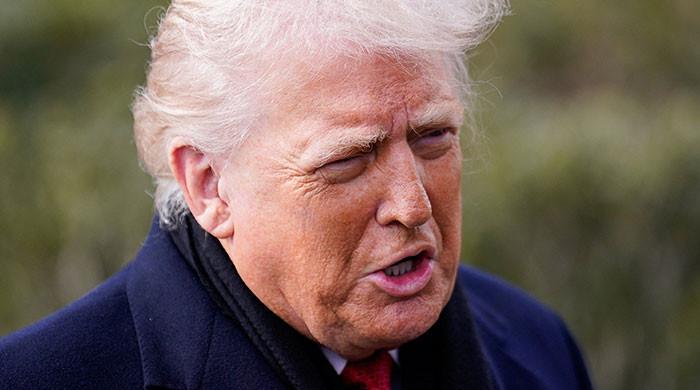
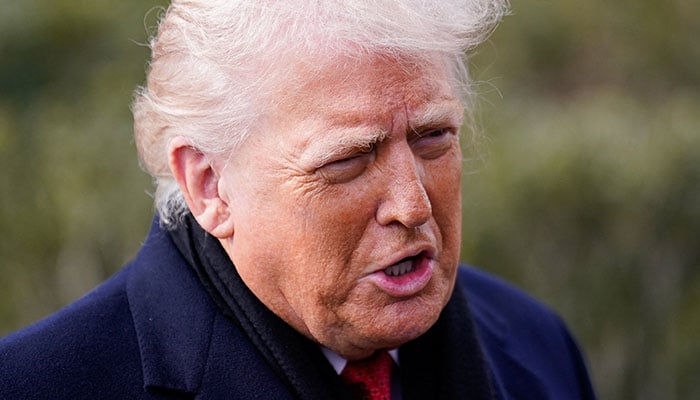
- US lawmakers visit Denmark to back Copenhagen and Greenland.
- Denmark strongly rejects Trump’s takeover idea.
- Lawmakers say most Americans do not support plan.
COPENHAGEN: US President Donald Trump on Friday warned that he could slap tariffs on countries that do not support his Greenland takeover plans, as US Congress members visited Copenhagen to give their backing for Denmark and its autonomous Arctic island.
The bipartisan delegation, on a two-day trip to the Danish capital, said the US president’s long-held territorial ambitions – strongly rejected by Denmark – were not shared by the American people.
Europeans have also been showing their backing for Greenland, in a military reconnaissance mission that a Danish general said Washington was invited to and which was linked to what Russia does after the war in Ukraine.
Trump, again insisting the United States needed mineral-rich Greenland for its “national security”, warned that he “may put a tariff” on countries that oppose that stance.
The 11 visiting US lawmakers held talks with Danish Prime Minister Mette Frederiksen and her Greenlandic counterpart Jens-Frederik Nielsen, as well as Denmark’s foreign and defence ministers, parliamentarians and business leaders.
Republican Senator Lisa Murkowski said there was “good dialogue” and stressed it was important to “nurture” ties between the United States, Denmark and Greenland.
“The vast majority” of Americans do not agree that it is a good idea for the United States to acquire Greenland, she told reporters.
“Greenland needs to be viewed as our ally, not as an asset,” she added.
One idiot
The visit follows a meeting in Washington on Wednesday at which Danish representatives said Copenhagen and Washington were in “fundamental disagreement” over Greenland’s future.
Democratic Senator Chris Coons said the purpose of the Congress members’ visit was to “listen respectfully to our friends, our trusted allies and partners here in Denmark and from Greenland”.
The lawmakers were then to return to the United States “and share those perspectives so that we can lower the temperature and have a more constructive dialogue about the best path forward”, he said.
In Greenland’s capital, Nuuk, residents welcomed the show of support.
“Congress would never approve of a military action in Greenland. It’s just one idiot speaking,” a 39-year-old union representative told AFP.
“If he (Trump) does it, he’ll get impeached or kicked out. If people in Congress want to save their own democracy, they have to step up,” said the union rep, speaking on condition of anonymity.
Demonstrations
Trump has repeatedly criticised Denmark – a NATO ally – for, in his view, not doing enough to ensure Greenland’s security.
The US president has pursued that argument, despite strategically located Greenland – as part of Denmark – being covered by NATO’s security umbrella.
The head of Denmark’s Joint Arctic Command, Major General Soren Andersen, said the United States were invited to the military mission, which he said was “about Russia”.
“When the war in Ukraine is over, hopefully with a good result for Ukraine, it is our expectation that Russia will move the resources they have been using in Ukraine to other theatres, including in the Arctic,” he told AFP.
“So, in order to prepare for that, we simply have to step up, train, and that is what we are doing up here.”
But Andersen said he had not seen any Russian or Chinese combat ships in the area in the two and a half years he has been commander.
Military personnel were more visible in Nuuk on Friday, an AFP journalist said, days after Denmark said it was beefing up its defence on the island.
The White House has said Trump’s aim to take over Greenland would not be affected by the European military presence, which French armed forces minister Alice Rufo said was a sign that the continent was prepared to defend sovereignty.
Britain, Finland, France, Germany, the Netherlands, Norway and Sweden have announced the deployment of small numbers of military personnel to prepare for future exercises in the Arctic.
Large demonstrations are planned across Denmark and Greenland on Saturday to protest against Trump’s plan.
Thousands of people have taken to social networks to say they intend to take part in the protests organised by Greenlandic associations in Nuuk and Copenhagen, Aarhus, Aalborg and Odense.
Politics
Iran protest movement subsides after waves of unrest
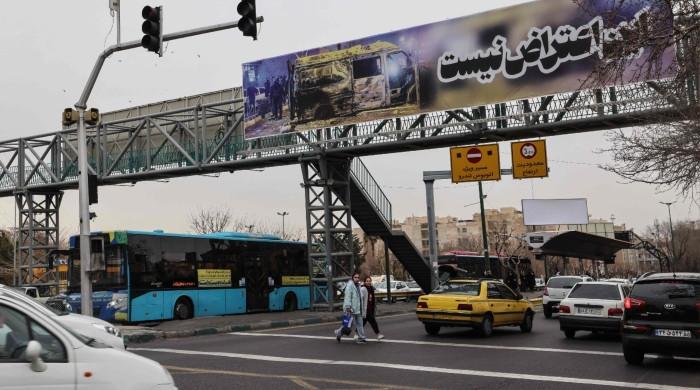
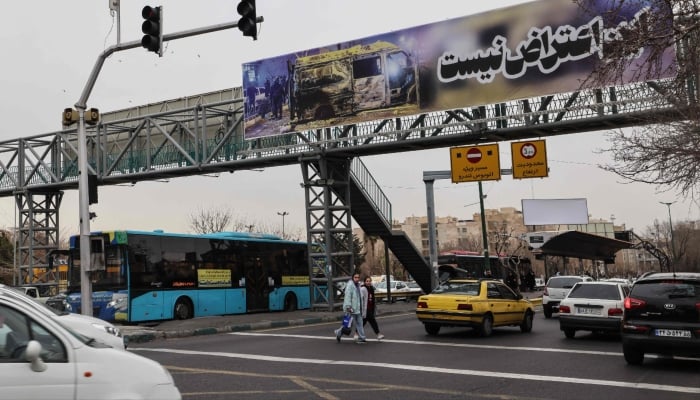
- Reza Pahlavi, son of Iran’s late shah, says govt will fall.
- Netblocks says internet blackout lasted over 180 hours.
- Tasnim reports rioters torched education office in Isfahan.
Tensions in Iran have subsided after three weeks of protests under an internet blackout, monitors said on Friday, a week after the start of the largest demonstrations in years challenging the country’s rulers.
The son of Iran’s late shah, however, said he was confident the government would fall and called for intervention, though the threat of new military action by the United States against Iran has appeared to have receded for the time being.
Protests sparked by economic grievances started with a shutdown in the Tehran bazaar on December 28 but turned into a mass movement demanding the removal of the system that has ruled Iran since the 1979 revolution.
People started pouring into the streets in big cities from January 8, but authorities immediately enforced a shutdown of the internet that has lasted over a week.
Reza Pahlavi, the son of Iran’s late shah, told a news conference in Washington that the government “will fall — not if, but when.”
“I will return to Iran,” he said.
Monitor Netblocks said that the “total internet blackout” in Iran had now lasted over 180 hours, longer than a similar measure that was imposed during the 2019 protests.
Amnesty International said this was being backed up by the use of heavily armed patrols and checkpoints to counter nationwide protests, with security forces visible in the streets.
‘Give Iran a chance’
Trump, who backed and joined Israel’s 12-day war against Iran in June, had not ruled out new military action against Tehran and made clear he was keeping a close eye on if any protesters were executed.
But a senior Saudi official told AFP on Thursday that Saudi Arabia, Qatar and Oman led “a long, frantic, diplomatic last-minute effort to convince President Trump to give Iran a chance to show good intention”.
While Washington appeared to have stepped back, the White House said on Thursday that “all options remain on the table for the president”.
Attention had focused on the fate of a single protester, Erfan Soltani, a 26-year-old who rights activists and Washington said was set to be executed as early as Wednesday.
The Iranian judiciary, however, said Soltani had not been sentenced to death, and his charges meant he did not risk capital punishment.
Rights groups have estimated that up to 20,000 people have been arrested. Security officials cited by the Tasnim news agency on Friday said around 3,000 people were arrested.
‘All Iranians united’
The US Treasury on Thursday announced new sanctions targeting Iranian officials including Ali Larijani, secretary of Iran’s Supreme Council for National Security.
Russian President Vladimir Putin, meanwhile, held telephone talks with Iranian President Masoud Pezeshkian in what the Kremlin described as “efforts to facilitate de-escalation”.
At the UN Security Council in New York, Iranian-American journalist Masih Alinejad, invited to address the body by Washington, said “all Iranians are united” against the government in Iran.
Iran’s representative at the meeting Gholamhossein Darzi accused Washington of “exploitation of peaceful protests for geopolitical purposes.”
There were, however, indications of unrest in some areas.
The state-affiliated Tasnim news outlet reported that rioters set fire to a local education office in Falavarjan County, in central Isfahan Province, on Thursday.
An elderly resident of a town in Iran’s northwestern region, where many Kurdish Iranians live and which has been the focus for many of the biggest flare-ups, said sporadic protests had continued, though not as intensely.
Describing violence earlier in the protests, she said: “I have not seen scenes like that before.”
The state-owned Press TV cited Iran’s police chief as saying calm had been restored across the country.
Tasnim news also reported what it described as the arrest of a large number of leaders of recent riots in the western province of Kermanshah, and the arrest of five people accused of vandalising a gas station and a base belonging to the Basij in the southeastern city of Kerman.
Politics
Modi-led BJP govt under fire for exiting Iran Chabahar port deal after US sanctions
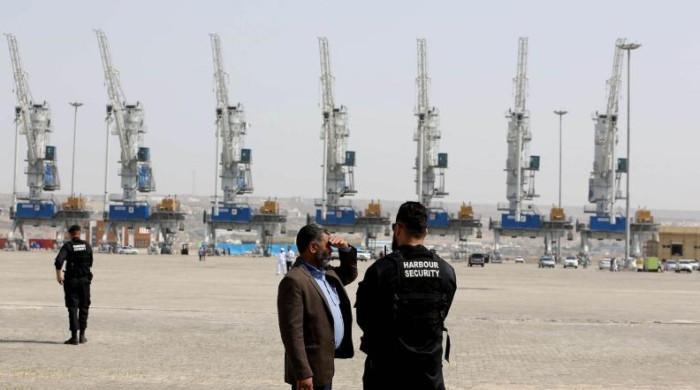
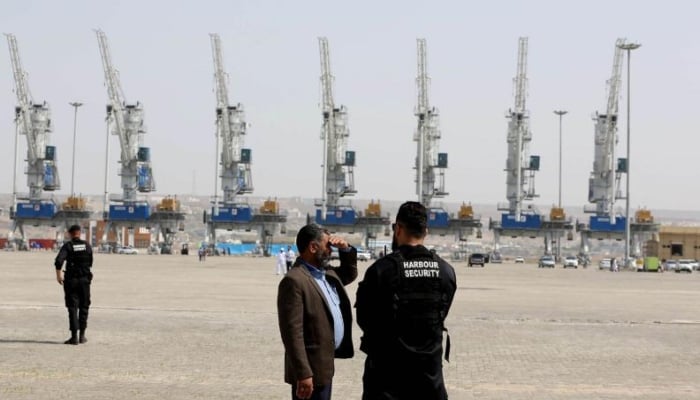
- New Delhi incurs $120m losses after exiting port development deal.
- Congress leader terms move “a new low” in India’s foreign policy.
- Experts say actions raise concerns about India’s role at Chabahar.
The Indian government, led by Prime Minister Narendra Modi, has come under heavy fire at home after it withdrew from the Chabahar port agreement with Iran, with critics arguing the move was a strategic retreat rather than a proactive foreign policy decision.
New Delhi was forced to abandon its involvement in the port after the United States imposed a 25% tariff on countries doing business with Tehran, The Economic Times reported on Thursday.
According to the publication, India’s withdrawal was carried out without any formal announcement, resulting in the loss of $120 million already paid to Iran.
The amount had been transferred before the decision to disengage and is now considered unrecoverable, the report stated.
The state-run company working at the port, India Ports Global Limited (IPGL), saw its board of directors submit collective resignations after the decision, while the company’s official website has also been shut down.
Congress party leader Pawan Khera termed the move “a new low” in the Modi-led government’s foreign policy.
“So the question is not of Chabahar Port or of Russian oil. The question is: Why is Modi allowing USA to arm-twist India?” he asked in an X post.
India assumed responsibility in 2024 for developing Chabahar port under a 10-year arrangement with Iran.
Meanwhile, a foreign journal reported that the $120 million already paid to Iran can now be used by it at its discretion for the port’s construction and development.
Observers described India’s withdrawal from Chabahar port as another major setback for New Delhi.
The Congress party sharply criticised the Modi-led government over the decision, saying the Indian prime minister “has once again surrendered to Trump”.
“$120 million of India’s taxpayers’ money was invested by the Modi government in this strategically important project, but now it’s all gone up in smoke,” read a post on the party’s X handle.
The Indian opposition party recalled Modi hailing the agreement as “a major strategic win”, saying India’s control over the port has been relinquished, with complete silence from the government.
“Unfortunately, Modi has bowed before Trump’s pressure and compromised India’s national interest,” the party stated.
Meanwhile, economic affairs experts believe the latest actions reinforced concerns surrounding India’s role at Chabahar.
They voiced concerns that India was using the port for nefarious objectives, saying that IPGL’s conduct suggested it was created primarily to acquire control of Chabahar.
-

 Tech4 days ago
Tech4 days agoNew Proposed Legislation Would Let Self-Driving Cars Operate in New York State
-

 Sports6 days ago
Sports6 days agoClock is ticking for Frank at Spurs, with dwindling evidence he deserves extra time
-
Sports7 days ago
Commanders go young, promote David Blough to be offensive coordinator
-

 Fashion6 days ago
Fashion6 days agoSouth India cotton yarn gains but market unease over US tariff fears
-

 Fashion6 days ago
Fashion6 days agoChina’s central bank conducts $157-bn outright reverse repo operation
-

 Entertainment3 days ago
Entertainment3 days agoX (formerly Twitter) recovers after brief global outage affects thousands
-

 Business7 days ago
Business7 days agoSoftBank reduces Ola Electric stake to 13.5% from 15.6% – The Times of India
-

 Sports6 days ago
Sports6 days agoUS figure skating power couple makes history with record breaking seventh national championship






